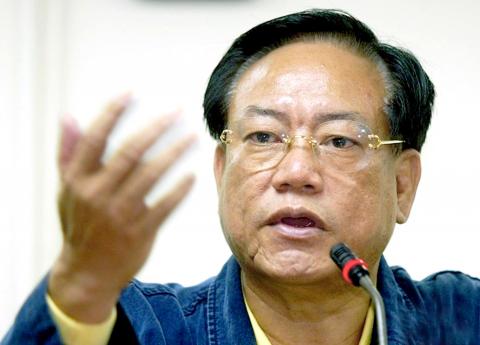The Ministry of Justice and the Taiwan High Prosecutors’ Office yesterday launched an investigation to re-examine misconduct and scandals involving fugitive Ho Chih-hui (何智輝), a former Chinese Nationalist Party (KMT) legislator and Miaoli County commissioner, after a media report saying that evidence relating to his bribing of judges had been destroyed.
Minister of Justice Tsai Ching-hsiang (蔡清祥) said he ordered the office to investigate the circumstances that led to the destruction of evidence in Ho’s case, and how Ho was able to evade police searches and flee to China.
In the first Taiwan High Court ruling in 2006, Ho was found guilty of receiving kickbacks on an industrial park development project in Tongluo Township (銅鑼), Miaoli County, during his tenure as county commissioner from 1993 to 1997.

Photo: Taipei Times
Ho’s case led to a scandal in the justice system, when investigators found that he had paid more than NT$10 million (US$320,770 at the current exchange rate) in bribes to four judges and a prosecutor, to ensure a “not guilty” verdict in the High Court retrial in May 2010.
After coming under investigation, the four High Court judges — Chen Jung-ho (陳榮和), Lee Chun-ti (李春地), Tsai Kuang-chih (蔡光治) and Lin Ming-chun (林明俊) — along with prosecutor Chiu Mao-jung (邱茂榮), were arrested and detained for questioning in July 2010.
The Judicial Reform Foundation called it the “Taiwanese judiciary’s most shameful episode” and “a major embarrassment” for the public to see that judges could be bought.
The foundation called for the resignation of top ministry and Judicial Yuan officials, and demanded reforms and a massive clean-up of what it called corrupt judges and prosecutors within the system.
Ho was sentenced to 19 years in prison in the first ruling, which was reduced to a 14-year term in the 2011 retrial, where he was ordered to return NT$223.5 million in illegal gains.
A High Court ruling in 2016 further reduced the prison term to 13 years and ordered him to pay back NT$52 million.
However, Ho and his wife, Wang Su-yun (王素筠), who also served as a KMT legislator in the early 1990s and was a codefendant in the case, never served any prison time, because they fled to China in 2010.
The foundation alleged that the couple had bribed other judicial and law-enforcement officials, because of leaks within the system and “inside help.”
The couple received advanced warnings of police raids or when they were to be brought in for questioning, the foundation said.
A news report on Wednesday said that evidence relating to Ho’s bribing of judges, which were stored at the Taipei District Prosecutors’ Office, had been dispatched to a Taipei incinerator and destroyed in 2013.
Taipei prosecutors issued a statement saying that the contractor hired for the job was ordered to clear out materials from a storage room that contained file records and evidence on litigation cases, but that items relating to Ho’s case were included by mistake.
However, legal reform activists said it smelled of foul play and possibly another “inside job,” citing too many coincidences of information being leaked or evidence destroyed relating to Ho’s case, and called for a thorough investigation.

Taiwanese can file complaints with the Tourism Administration to report travel agencies if their activities caused termination of a person’s citizenship, Mainland Affairs Council Minister Chiu Chui-cheng (邱垂正) said yesterday, after a podcaster highlighted a case in which a person’s citizenship was canceled for receiving a single-use Chinese passport to enter Russia. The council is aware of incidents in which people who signed up through Chinese travel agencies for tours of Russia were told they could obtain Russian visas and fast-track border clearance, Chiu told reporters on the sidelines of an event in Taipei. However, the travel agencies actually applied

New measures aimed at making Taiwan more attractive to foreign professionals came into effect this month, the National Development Council said yesterday. Among the changes, international students at Taiwanese universities would be able to work in Taiwan without a work permit in the two years after they graduate, explainer materials provided by the council said. In addition, foreign nationals who graduated from one of the world’s top 200 universities within the past five years can also apply for a two-year open work permit. Previously, those graduates would have needed to apply for a work permit using point-based criteria or have a Taiwanese company

The Shilin District Prosecutors’ Office yesterday indicted two Taiwanese and issued a wanted notice for Pete Liu (劉作虎), founder of Shenzhen-based smartphone manufacturer OnePlus Technology Co (萬普拉斯科技), for allegedly contravening the Act Governing Relations Between the People of the Taiwan Area and the Mainland Area (臺灣地區與大陸地區人民關係條例) by poaching 70 engineers in Taiwan. Liu allegedly traveled to Taiwan at the end of 2014 and met with a Taiwanese man surnamed Lin (林) to discuss establishing a mobile software research and development (R&D) team in Taiwan, prosecutors said. Without approval from the government, Lin, following Liu’s instructions, recruited more than 70 software

Taiwanese singer Jay Chou (周杰倫) plans to take to the courts of the Australian Open for the first time as a competitor in the high-stakes 1 Point Slam. The Australian Open yesterday afternoon announced the news on its official Instagram account, welcoming Chou — who celebrates his 47th birthday on Sunday — to the star-studded lineup of the tournament’s signature warm-up event. “From being the King of Mandarin Pop filling stadiums with his music to being Kato from The Green Hornet and now shifting focus to being a dedicated tennis player — welcome @jaychou to the 1 Point Slam and #AusOpen,” the